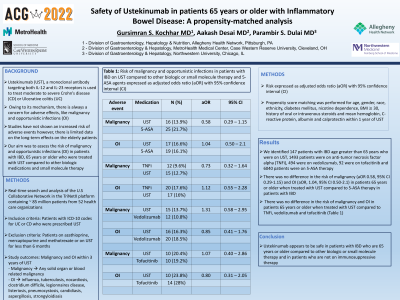Back


Poster Session A - Sunday Afternoon
Category: IBD
A0390 - Safety of Ustekinumab in Patients 65 Years or Older With Inflammatory Bowel Disease: A Propensity-Based Match Analysis
Sunday, October 23, 2022
5:00 PM – 7:00 PM ET
Location: Crown Ballroom

Has Audio
- GK
Gursimran S. Kochhar, MD
Allegheny Health Network
Pittsburgh, PA
Presenting Author(s)
Gursimran S. Kochhar, MD1, Aakash Desai, MD2, Parambir S. Dulai, MD3
1Allegheny Health Network, Pittsburgh, PA; 2MetroHealth Medical Center/Case Western Reserve University, Cleveland, OH; 3Northwestern University, Chicago, IL
Introduction: Ustekinumab (UST) is a monoclonal antibody targeting both IL-12 and IL-23 receptors. Owing to its mechanism, there is always a concern for its adverse effects, including malignancy and opportunistic infections (OI). Our study aimed to study the risk of malignancy and OI in patients who were treated with UST and were 65 and older
Methods: A retrospective cohort study was conducted using TriNetX, a multi-institutional database of more than 70 million patients from 49 healthcare organizations in the USA. We compared the 3-year risk of malignancy and opportunistic infections (OIs) in patients with inflammatory bowel disease (IBD) who were treated with UST who were 65 years and older compared with patients between the age of 18-65 years. Exclusion criteria included patients who were on the biologic agent for less than 3 months or had a prior history of any adverse event. 1:1 propensity-score matching was performed, gender, race, ethnicity, diabetes, nicotine dependence, obesity, PO and IV steroids, mean Hb, CRP, albumin, and calprotectin within 1 year before medication initiation. Adjusted odds ratios (aOR) with 95% confidence interval (CI) were calculated to express the risk of each adverse event
Results: A total of 22,242 patients with IBD were identified who were 65 years or older. At the time of analysis, 147 patients received UST, 1,493 patients were on anti-TNF alpha (TNFi), 494 were on vedolizumab (VDZ), and 92 on tofacitinib, and 6040 patients were on a 5-ASA therapy. There was no difference in malignancy rates ( OR: 0.58, 95% CI; 0.29-1.15) and OI ( OR: 1.04, 95% CI; 0.50-2.1) in patients 65 years or older when treated with UST compared to 5-ASA therapy. There was also no difference seen in outcomes of malignancy and OI when UST was compared with other medications (TNFi, VDZ, tofacitinib) in the cohort
Discussion: In conclusion, Ustekinumab appears safe to be used in patients with IBD who are 65 years or older
Disclosures:
Gursimran S. Kochhar, MD1, Aakash Desai, MD2, Parambir S. Dulai, MD3. A0390 - Safety of Ustekinumab in Patients 65 Years or Older With Inflammatory Bowel Disease: A Propensity-Based Match Analysis, ACG 2022 Annual Scientific Meeting Abstracts. Charlotte, NC: American College of Gastroenterology.
1Allegheny Health Network, Pittsburgh, PA; 2MetroHealth Medical Center/Case Western Reserve University, Cleveland, OH; 3Northwestern University, Chicago, IL
Introduction: Ustekinumab (UST) is a monoclonal antibody targeting both IL-12 and IL-23 receptors. Owing to its mechanism, there is always a concern for its adverse effects, including malignancy and opportunistic infections (OI). Our study aimed to study the risk of malignancy and OI in patients who were treated with UST and were 65 and older
Methods: A retrospective cohort study was conducted using TriNetX, a multi-institutional database of more than 70 million patients from 49 healthcare organizations in the USA. We compared the 3-year risk of malignancy and opportunistic infections (OIs) in patients with inflammatory bowel disease (IBD) who were treated with UST who were 65 years and older compared with patients between the age of 18-65 years. Exclusion criteria included patients who were on the biologic agent for less than 3 months or had a prior history of any adverse event. 1:1 propensity-score matching was performed, gender, race, ethnicity, diabetes, nicotine dependence, obesity, PO and IV steroids, mean Hb, CRP, albumin, and calprotectin within 1 year before medication initiation. Adjusted odds ratios (aOR) with 95% confidence interval (CI) were calculated to express the risk of each adverse event
Results: A total of 22,242 patients with IBD were identified who were 65 years or older. At the time of analysis, 147 patients received UST, 1,493 patients were on anti-TNF alpha (TNFi), 494 were on vedolizumab (VDZ), and 92 on tofacitinib, and 6040 patients were on a 5-ASA therapy. There was no difference in malignancy rates ( OR: 0.58, 95% CI; 0.29-1.15) and OI ( OR: 1.04, 95% CI; 0.50-2.1) in patients 65 years or older when treated with UST compared to 5-ASA therapy. There was also no difference seen in outcomes of malignancy and OI when UST was compared with other medications (TNFi, VDZ, tofacitinib) in the cohort
Discussion: In conclusion, Ustekinumab appears safe to be used in patients with IBD who are 65 years or older
Disclosures:
Gursimran Kochhar: GIE Medical – Advisor or Review Panel Member. Lilly Pharma – Advisor or Review Panel Member.
Aakash Desai indicated no relevant financial relationships.
Parambir Dulai: BMS – Consultant. DigbiHealth – Stock Options. Gilead – Consultant. Janssen – Consultant. Lily – Consultant. Novartis – Consultant. Pfizer – Consultant, Grant/Research Support. PreciDiag – Royalties. Takeda – Consultant, Grant/Research Support.
Gursimran S. Kochhar, MD1, Aakash Desai, MD2, Parambir S. Dulai, MD3. A0390 - Safety of Ustekinumab in Patients 65 Years or Older With Inflammatory Bowel Disease: A Propensity-Based Match Analysis, ACG 2022 Annual Scientific Meeting Abstracts. Charlotte, NC: American College of Gastroenterology.

